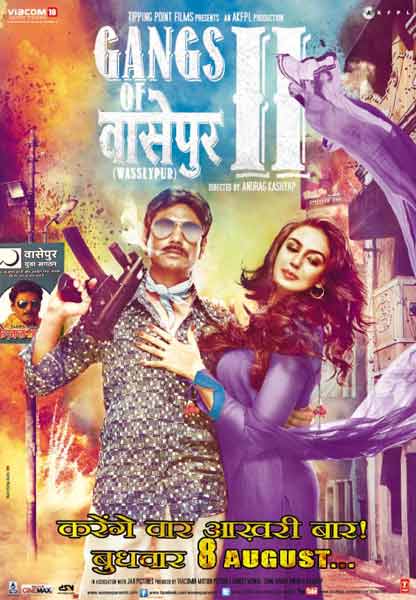

In 1947, independent India begins to assert its authority over itself. The enraged Shahid kills the coal mine's muscleman who had denied him leave on that day. He is unable to be at his wife's side during childbirth, and she dies.

They settle down in Dhanbad where Shahid begins work as a labourer in a coal mine. The Qureshi clans eventually find out and order the banishment of Shahid and his family from Wasseypur. In 1941, Shahid Khan ( Jaideep Ahlawat), a Pathan, takes advantage of the mysteriousness of the faceless dacoit, Sultana, a Qureshi, by impersonating his identity to rob British ferry trains. The region was the domain of the faceless dacoit Sultana Qureshi who robbed British trains in the night and thus held some patriotic value for the locals. The village has been historically dominated by the Qureshi Muslims, a sub-caste of animal butchers who are feared by the non-Qureshi Muslims living there and Dhanbad by extension.ĭuring British colonial rule, the British had seized the farm lands of Dhanbad for coal which began the business of coal mining in Dhanbad. In 2000, Wasseypur and Dhanbad were redistricted for a second time into the newly formed state of Jharkhand where they remain. After India gained independence in 1947, they were carved out of Bengal and redistricted into the state of Bihar in 1956. During the British Raj, Wasseypur and Dhanbad were located in the Bengal region. Nasir's narration describes the history and nature of Wasseypur. The whole scene is then revealed in the sequel. The scene cuts abruptly for a prologue by the narrator, Nasir ( Piyush Mishra). Singh (Satya Anand) that the family has been successfully executed but he is double crossed by JP as a firefight erupts between them and a police check post blocking their escape route. The leader ( Pankaj Tripathi) informs minister J.P. After heavy firing on the house, they retreat from the crime scene in a vehicle, convinced they have killed everyone within. They surround the house and unleash a wave of bullets and grenades on it with the intention of killing the family inside it. In January 2004, a gang of heavily armed men scour and finally narrow down on a house in Wasseypur.

Īlthough not an individual financial success, it is a combined gross of ₹50.81 crore that facilitated a modest commercial return due to its A (Adults Only) certificate Gangs of Wasseypur – Part 1 also won four Filmfare Awards, including the Critics Award for Best Film, while Chadda won the Critics Award for Best Actress, at the 58th Filmfare Awards. It received nominations for Best Film and Best Director for Kashyap at the 55th Asia-Pacific Film Festival, and won for Best Audiography at the 60th National Film Awards, while Siddiqui won a Special Mention for acting at the same ceremony. Upon release, Gangs of Wasseypur – Part 1 received critical acclaim, and won a number of awards. The film was theatrically released on 22 June 2012, but was banned in Kuwait and Qatar for violent content. It was filmed in Varanasi, Bihar, and Chunar, with these settings inspiring the film's soundtrack, which consists mainly of Indian folk. It was also screened at the Sundance Film Festival in January 2013. Gangs of Wasseypur was screened in its entirety at the 2012 Cannes Directors' Fortnight, marking one of the only Hindi-language films to achieve this. Part 1 stars an ensemble cast, featuring Manoj Bajpayee, Richa Chadda, Reema Sen, Piyush Mishra, Nawazuddin Siddiqui, Vineet Kumar Singh, Pankaj Tripathi, Huma Qureshi, Anurita Jha and Tigmanshu Dhulia.Īlthough both parts were shot as a single film measuring a total of 319 minutes, no Indian theatre would screen a five-hour film, so it was divided into two parts. It is the first installment of the Gangs of Wasseypur series, centered on the coal mafia of Dhanbad, and the underlying power struggles, politics and vengeance between three crime families from 1941 to the mid-1990s.

Gangs of Wasseypur – Part 1 (stylised as Gangs of वासेपुर) is a 2012 Indian Hindi-language gangster crime action-thriller film directed by Anurag Kashyap, and written by Kashyap and Zeishan Quadri.


 0 kommentar(er)
0 kommentar(er)
